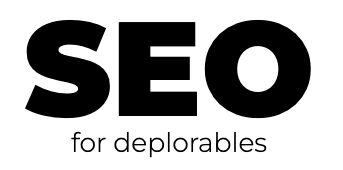
What is SEO for Deplorables?
Simply put, SEO for Deplorables is a Web site dedicated to free speech.
I’ve been an SEO professional for over 25 years. Over the years I’ve helped many, many companies rank on Google, from startups and small businesses to some of the world’s largest corporations.
Over the years I’ve gotten to know Google pretty well. In the early years, I loved everything about them. Their search engine was fantastic, I loved Gmail, and I rooted for them wholeheartedly as they challenged Microsoft—who was then the big bad wolf—in the Web browser space and even the office productivity space.
Like many I appreciated their motto: Don’t Be Evil.
Google 2018: Protecting Users from Online Scams
From 1998 to about 2008 Google was pretty good. Regardless of what you were searching for, its search results was a pretty balanced and objective reflection of the Internet.
Around 2008, Google results started to get really, really bad because of an emerging industry called “Search Engine Optimization”. While many in this field (including myself) tried to work within the rules (we were called “white hat SEOs”), there were others who tried their best to cheat by uncovering and exploiting every flaw in Google’s Algorithm. They were called “black hat SEOs”.
Between 2008 and 2018, there was a cat-and-mouse game as black-hat SEOs found a flaw in Google’s algorithm to exploit and Google patched it. Black hat SEOs found that they could rank on Google simply by stuffing bad content with keywords. In 2011, Google released an algorithm update called “Panda” to fight them. Black hat SEOs found they could buy and sell links to manipulate search rankings. In 2012, Google released an algorithm updated called “Penguin” to fight that. This pattern continued; as black hat SEOs got more and more sophisticated, Google had to make hundreds of changes to its algorithm to counter them.
On August 1, 2018, Google introduced a broad core algorithm update aimed at search queries that had to do with money and health (called in SEO circles “YMYL”, or “Your Money, Your Life”).
Its purpose was legitimate: the Web was rampant with sites where the most vulnerable people were exposed to the worst scams. People with severe and terminal illnesses were being sold 21st century snake oil that drained their bank accounts and gave them false hope. Senior citizens were being scammed out of their life savings.
Google’s algorithm was modified to ensure that illegal and illicit sites that might pose harm to people’s health or finances weren’t given visibility on Google.
Considering the sheer number of scam artists and site out there, Google did a pretty good job. Legitimate medical and financial sites ranked at the top of Google’s search pages, while scam sites didn’t get any visibility at all. Google was doing good for the world. Or so it seemed.
Google 2019: Protecting Users from…2016??
In 2016, an event happened that was cataclysmic to Google’s executives and much of their staff. Donald J. Trump was elected President. In the eyes of Google’s executives and management team, the 63 million Americans who voted for Trump could not possibly have been basing their vote on legitimate policy opinions. No, they must have been brainwashed, and in a now-famous internal all-hands meeting their executive team promised that they would “fix it”.
Similar struggle sessions were happening all over Silicon Valley, from Facebook in Menlo Park to Twitter in San Francisco to Google in Mountain View.
Following these struggle sessions, Google and the social media companies took action. In their minds, the 63 million Americans who voted for Donald Trump were victims of the biggest scam ever, one far more dangerous—to them—than Payday Loans and Nigerian Princes.
On September 9, 2016 Hillary Clinton delivered a speech where she described half of all Trump supporters as a basket of deplorables who are “racist, sexist, homophobic, xenophobic, Islamaphobic”.
Are 31.5 million Americans really “Deplorables”?
In 2016 my brother and sister, whom I love dearly, both voted for Hillary Clinton. So did my best friend. And so did many of my friends and co-workers.
But I had many friends voted for Donald Trump as well, including many of my best friends and more cherished co-workers.
Me? I didn’t vote in 2016. It was the first time in more than 25 years that I didn’t vote in a Presidential election. I just couldn’t stand either candidate. Hillary was just too annoyingly screechy. And while I enjoyed Trump on “The Apprentice”, I couldn’t get past the image of him in his younger days as a smarmy, pompous sleaze bag.
But when I heard Hillary Clinton’s words, cognitive dissonance kicked in. How is it that Trump supporters are all those things, when the vast majority of people I knew who supported Trump were wonderful people? I knew Trump supporters of all colors and races. I knew Trump supporters who were gay. I knew Trump supporters who were women. I knew Trump supporters who were old and young, black, white, Asian, and Hispanic. Every last one of them would give me the shirt off their back, and I would do the same for them. Were they truly “deplorable”?
The Purge
We all saw what happened next. Employees at Facebook, Twitter, and Google were horrified at the thought that Trump and his supporters were able to use their platforms to get their message out.
They took action, all in the name of “protecting” the American public. In most cases they used the same processes and algorithms used to protect their audience from online scams to “protect” their audience from “dangerous speech”.
We all saw what happened next on Twitter. Accounts that just asked questions about the integrity of the 2020 Presidential elections were banned. Then, accounts that questioned the origins of COVID-19 or the efficacy of the COVID vaccine were banned. Journalists, members of Congress, and even the former President of the United States were banned. When Twitter was banning a few radical nuts that was one thing. But this started to feel more and more like people getting banned for Thoughtcrime.
Elon Musk, of course, saved Twitter and turned it into X. The “Twitter Files” famously exposed what we all knew: that social media companies were actively banning, censoring, issuing warnings, and blocking ideas and thoughts about politics, medicine, social issues, and science that didn’t conform with their worldview.
Here’s the chilling reality. Elon Musk is only one man. The progressive left and the media establishment have already tried to destroy him, and there are moments where they got chillingly close. If they take him out, so will go X, and so will go one of the few bulwarks of free speech in social media
Free speech is still under assault. Unlike with Twitter there was no billionaire who walked into the corporate offices of Google/YouTube, Facebook, or TikTok with a sink in his hand, social media sites which never took their foot off the gas as far as censorship and illiberalism.
What this Site Is About
Like I said, I’ve been in the SEO space for over 25 years and as Liam Neeson would say, “I possess a particular set of skills”.
One of them is being able to look historically at Google rankings, tell you exactly why sites rose and dropped over time, and why.
I’ll be publishing a series of blog posts which I’ll call, tongue-in-cheekily, “The Google Files” that will show you how Google has misused its power to silence free speech, all in the name of protecting the public.
It’s unlikely that I’ll be telling you anything you didn’t already know or suspect or that Google whistleblowers haven’t already revealed. The difference is that I come with receipts: I’ll use publicly available data to show you exactly how what the Google whistleblowers warned us about has come true.
I’ll preface by saying that I don’t believe that Google did anything illegal. But if you believe in the First Amendment of the U.S. Constitution as I do, I think you’ll agree with me that what they did was a complete abuse of their power.
Where I Stand Politically
I’m what they used to call a “classical liberal”, which is probably bests epitomized by a phrase made popular by a biographer of Voltaire: “I may not agree with what you say, but I will defend to the death your right to say it”.
I can’t be painted with any political brush. I’m not registered with any political party; I’ve voted for Republicans, I’ve voted for Democrats, I’ve voted for Independents, I’ve voted for Libertarians. Some might consider me on the radical left on some issues and on the radical right on others.
You might find that many of my posts lean to “The Right”, but that’s mainly because I see most abuses of power happening on “The Left” at the moment. You’ll have to trust me when I say that if the pendulum were to swing the other way again, I would defend the powerless. “Where were you on January 6” today is as chilling a statement to me as “Are you or have you ever been a member of the Communist Party” in 1952 because it’s not an honest questions intended to start a healthy debate, it’s a question intended to root up dissidents for them to be carted off and destroyed.
While the name of this site is a tongue-in-cheek dig at Hillary Clinton’s comments, the advice I’m going to give on this site is open to EVERYONE who has ever felt that someone has wanted to silence you, whether you’re conservative, progressive, libertarian, liberal, or moderate. I welcome Bernie Sanders supporters as much as I do Donald Trump supporters to follow whatever advice I have to give.



